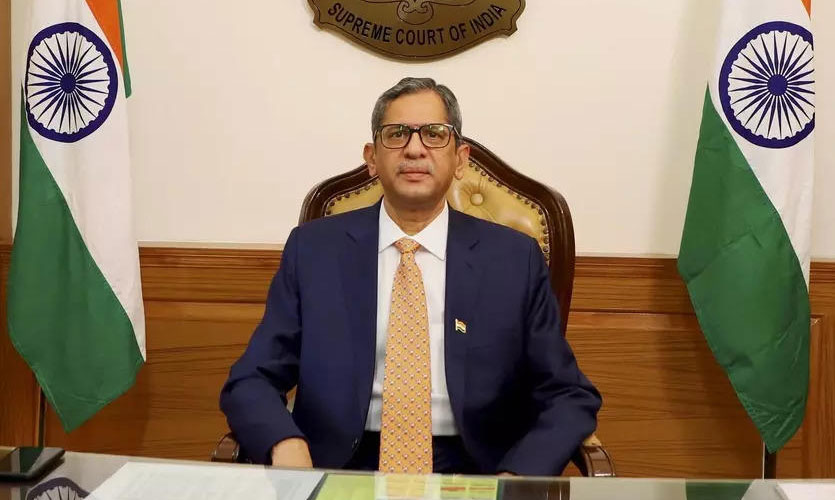In tune with Karl Marx’s quote “Workers of the world unite. You have nothing to lose but your chains”, the Chief Justice of India, N.V. Ramana stated that women across the world should unite because they have “nothing to lose but their chains”. Chief Justice Ramana advocated for 50 percent reservation for women at all levels of the judiciary. He also called for “urgent correction” of gender imbalance and demanded reservation across all law colleges in the country.
CJI Ramana observed that women across the country must “shout with anger” and demand for reservation, not as charity but as a matter of right. He cited the years of suppression of women to note that it is high time that the goal to provide equal opportunities to women be attained by the Supreme Court and other courts as well.
Addressing the felicitation function organised by lady advocates to honor the CJI and other judges of the apex court, Chief Justice Ramana said, “Enough of suppression of thousands of years. It is high time we have 50 percent representation of women in judiciary. It is your right. It is not a matter of charity,” He continued, “There is a need to strongly recommend supporting the demand for some percentage reservation in all law schools in the country.”
Chief Justice Ramana pointed out that the strength of women in the lower judiciary is less than 30 percent, while in the High Courts it stands lower at 11 percent. He mentioned only four out of 33 judges in the Supreme Court are women, and among the 1.7 million lawyers, only 15 percent are women. He further noted that women constitute only 2 percent of the elected representatives at the State Bar Councils.
“This needs urgent correction. People will cite difficulties that women have to face to be fully represented. That is not correct. I do agree that there is an uncomfortable environment, lack of infrastructure, crowded courtrooms, lack of washrooms, lack of creches and lack of sitting places, which are some of the major issues which are unfriendly to the women lawyers in the system,” said CJI Ramana.
“In 6,000 courts across the country, 22 percent of them do not have separate toilets (for women) and even lady officers also have to suffer from this,” said Chief Justice Ramana, adding, “So these are the ground realities which we have to tackle immediately and that is the reason why I am proposing certain issues to the executive to take and correct this.”
“I am also forcing the executive for applying necessary correctives… I am happy to have colleagues in the Collegium who are progressive and determined to bridge the gap in the higher judiciary. I strongly advocate reservation of a significant percentage of seats in law schools and universities for women, as a first step. Ultimately, inclusion of women judges and lawyers will substantially improve the quality of justice delivery,” said the CJI.
Chief Justice Ramana also assured that physical hearings in the courtroom will soon resume. He informed that the apex court is working on revising SOPs for entry of lawyers in the courtrooms. “Because, in the courtroom, the judges sit behind the partition on the docks, but the lawyers will be at the front together. That is why we are more concerned about the health and safety of the lawyers than the judges,” he said.
In line with the CJI, Justice B.V. Nagarathna, who is in line to be the first woman Chief Justice of the country, noted three separated aspects for better participation of women in the judiciary. These are the entry of women lawyers, retention of women in the bar, and advancement of women in the upper echelons. Justice Nagarathna stressed on the need to not just encourage women to join the legal system but also to facilitate their advancement to higher levels.
Read more: Supreme Court Questions The NIA’s Stand On UAPA Charges On Kerala Youths
Justice Nagarathna, who is also the first woman lawyer to be appointed as a judge of the Karnataka High Court in 50 years, said, “Lordship, we women lawyers will scout from across the country, so there can be more women appointed,” adding, “Advancing women’s participation in the judiciary promotes gender equality in various ways. It helps in changing gender stereotypes. It paves the way for women’s greater representation in other branches such as executive and Legislature. They will be inspired by how women break the glass ceiling, and a higher number of women judges will give strength to women to seek justice in courts.”
Justice Hima Kohli also batted in favour of the issue and said that the appointment of three women judges to the Supreme Court Bench was a “starting point”. “As a first-generation lawyer, the satisfaction is higher. The narrow paths that we all had carved out in the 80s have become highways now. We have women senior advocates, Additional Solicitor Generals and others who are inspirations to the younger generation,” said Justice Kohli.










